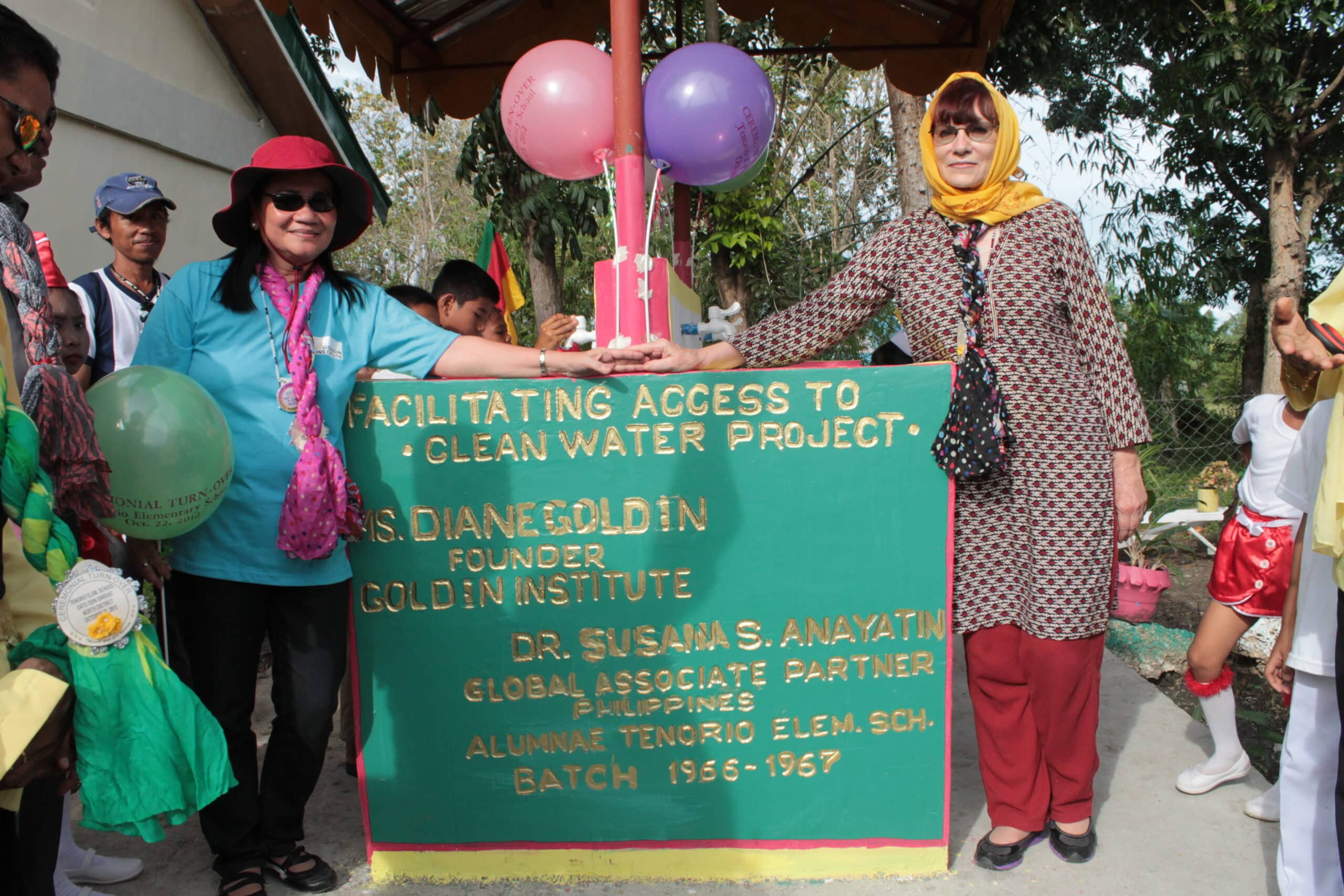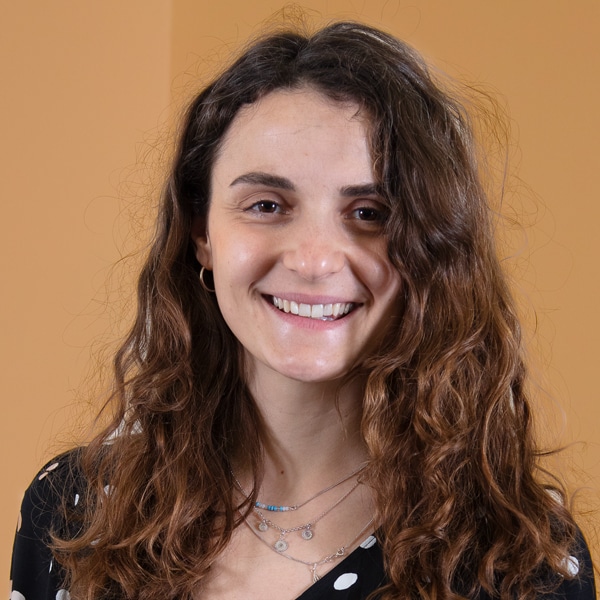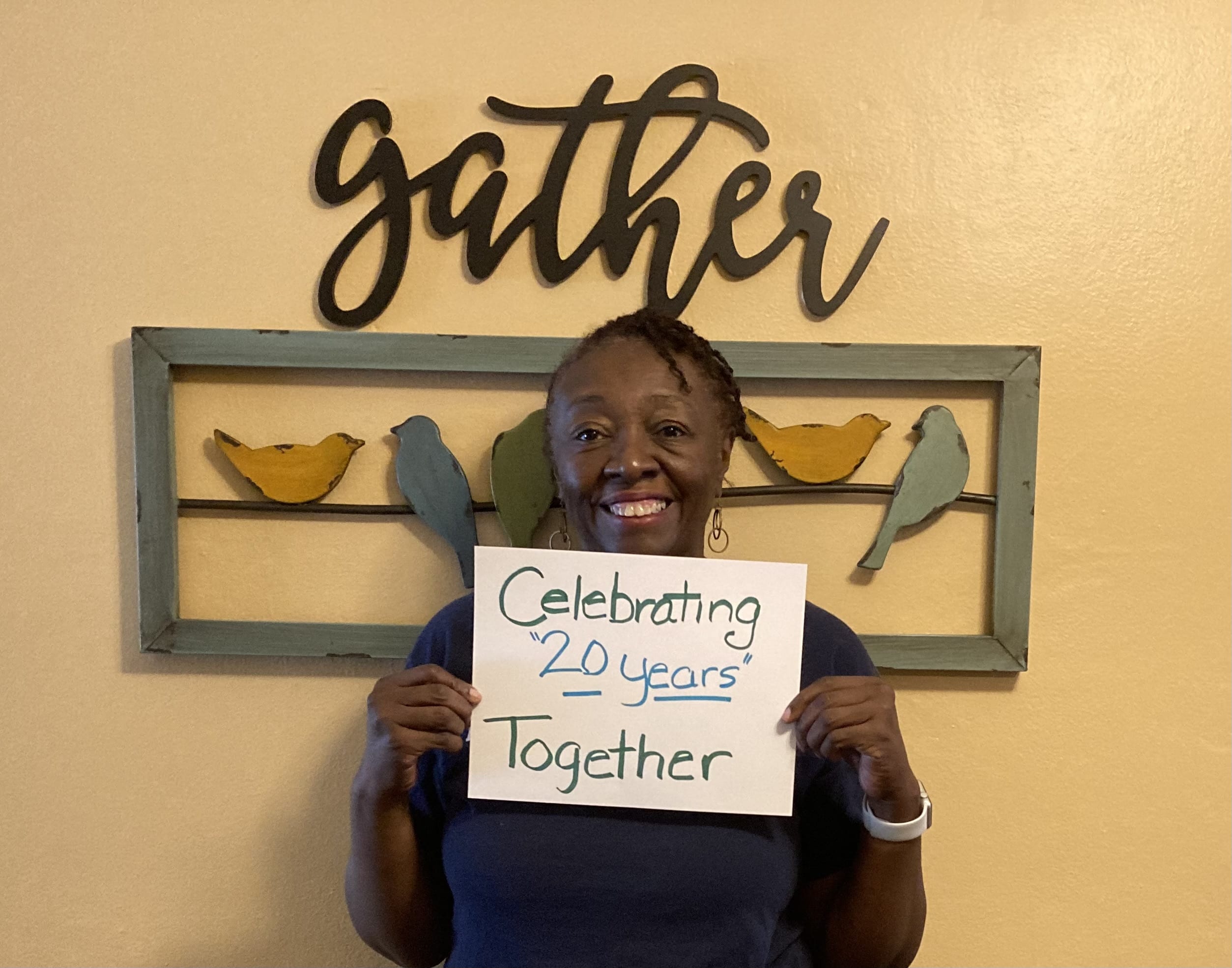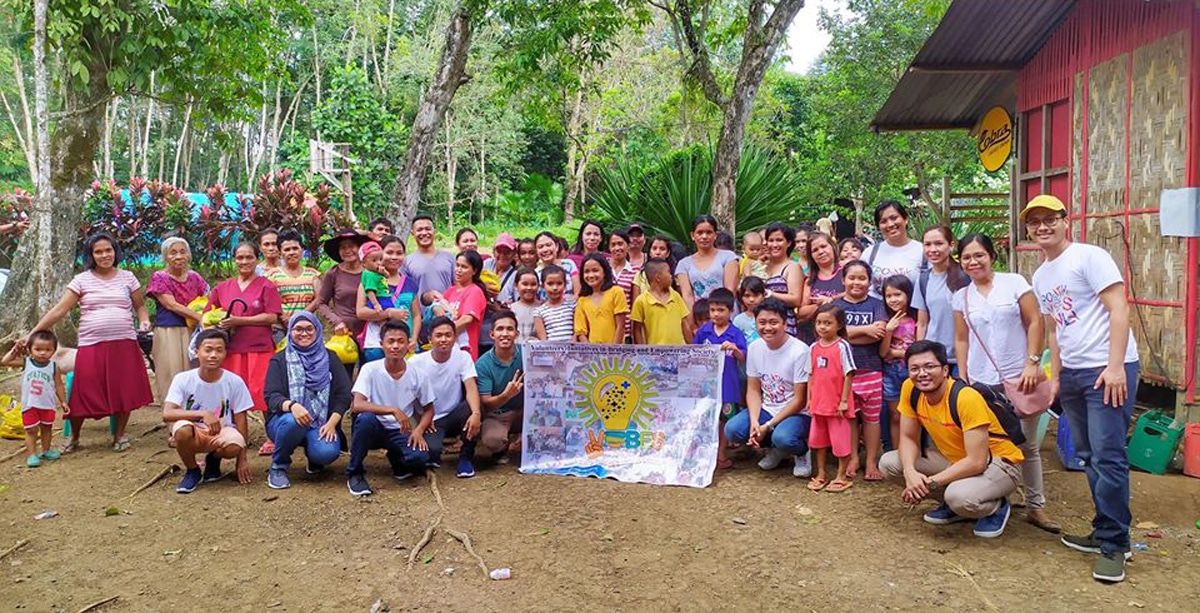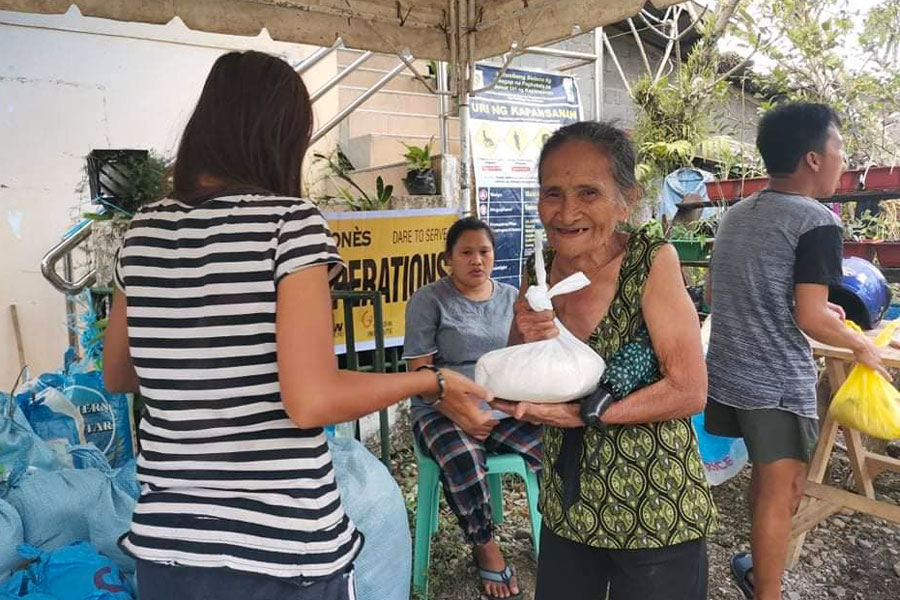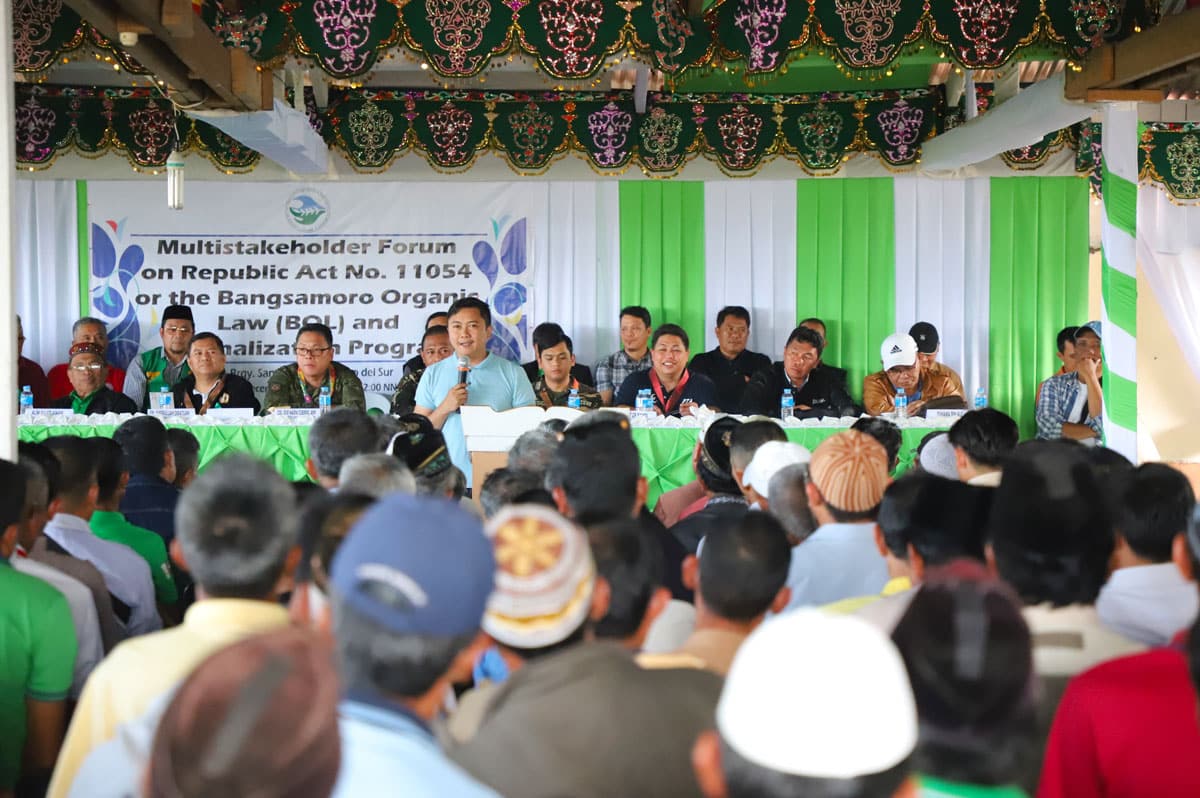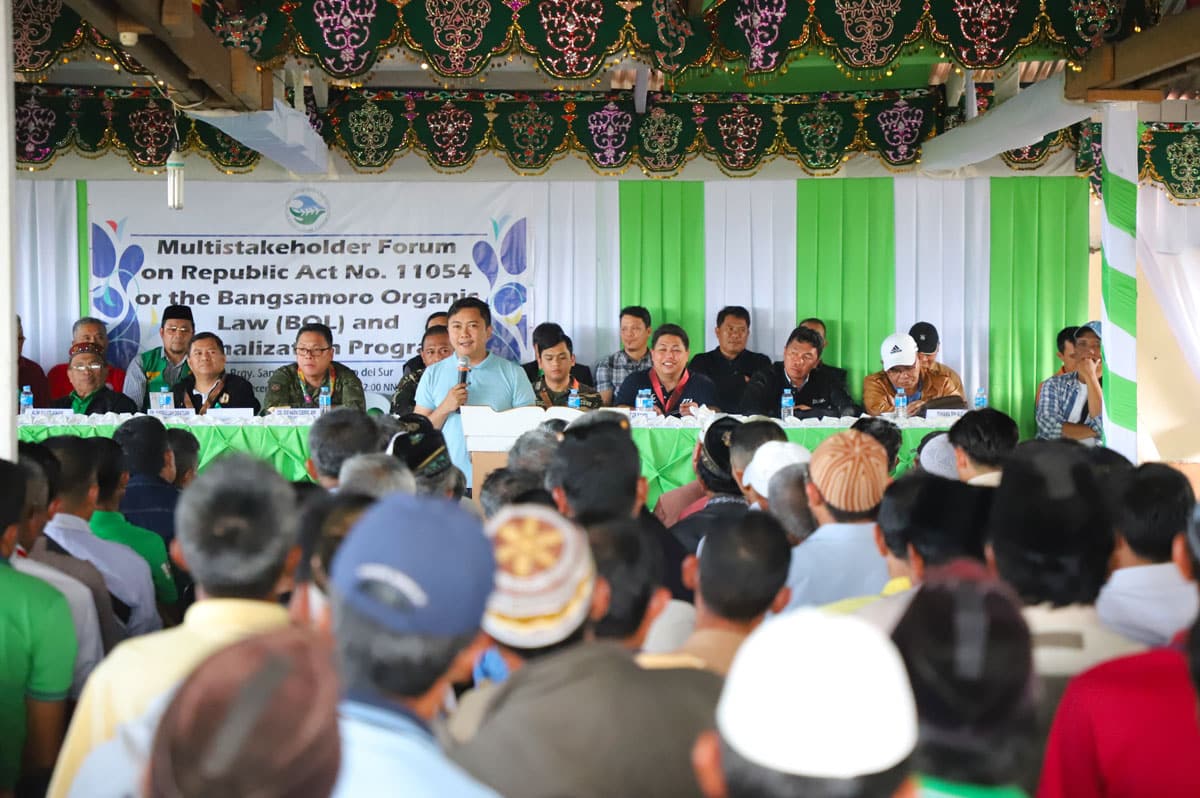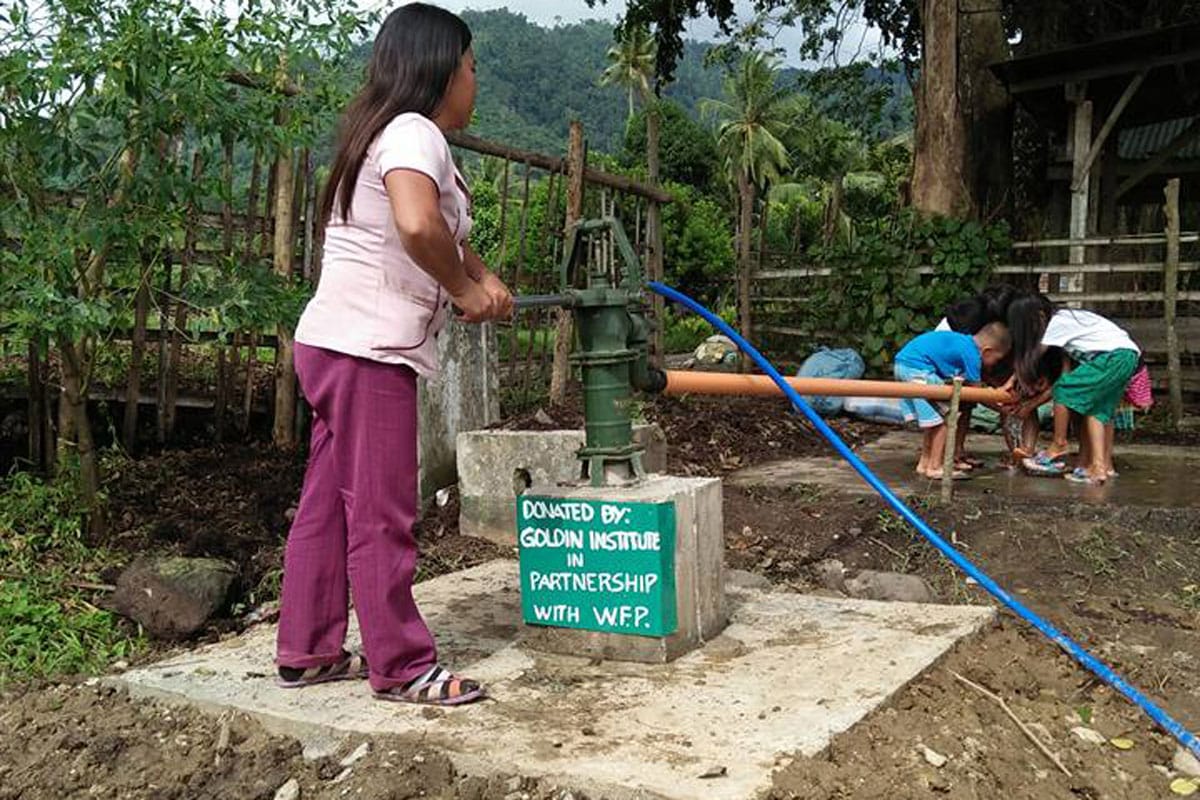Building Water Pumps, Peace, and Community
Dr. Susana Salvador Anayatin, a member of the Parliament of the Bangsamoro Transition Authority in the Philippines, has partnered with the Goldin Institute since its launch in 2002. Beginning with water pump installations in rural communities, Dr. Anayatin has since paved a path that is a testament to growth, positive change, and tireless activism in helping her community with peace and development initiatives through her community activism, institutional work, and joining forces with the Goldin Institute. Her engagement with the Goldin Institute inspires her to become more passionate about working for the welfare of the orphans and widows of war and the underserved sectors of our society.
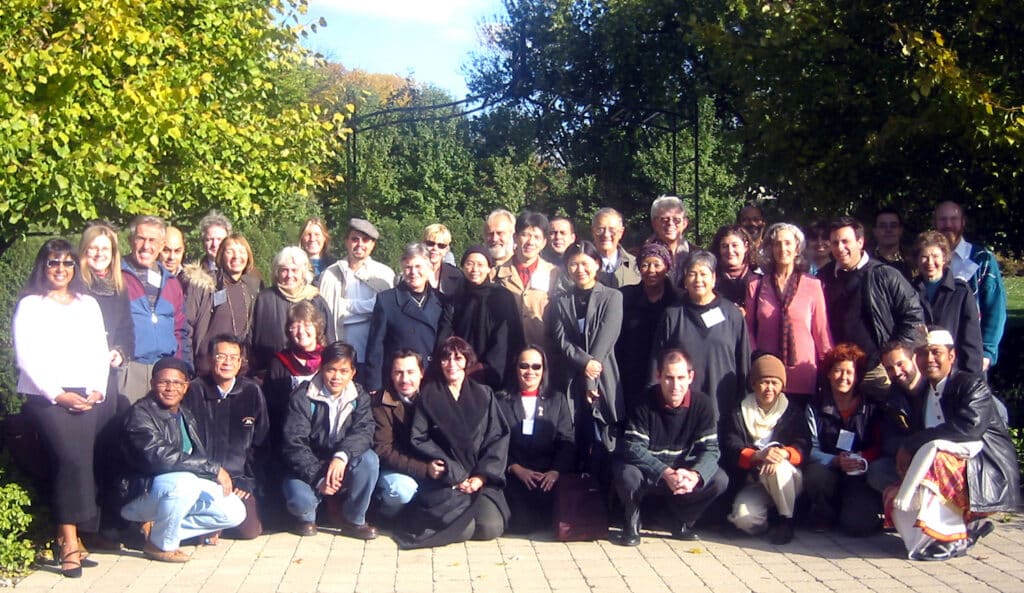
On a personal level, as a global associate of the Goldin Institute, Dr. Anayatin learned to become a global citizen by engaging with people from different countries. In this interview, she dwells more on these and how her motivation stems from personal tragedy, which she turned into strength and courage. She also touched upon impactful initiatives in the Philippines, emphasizing her transformative journey and dedication to peace-building efforts.
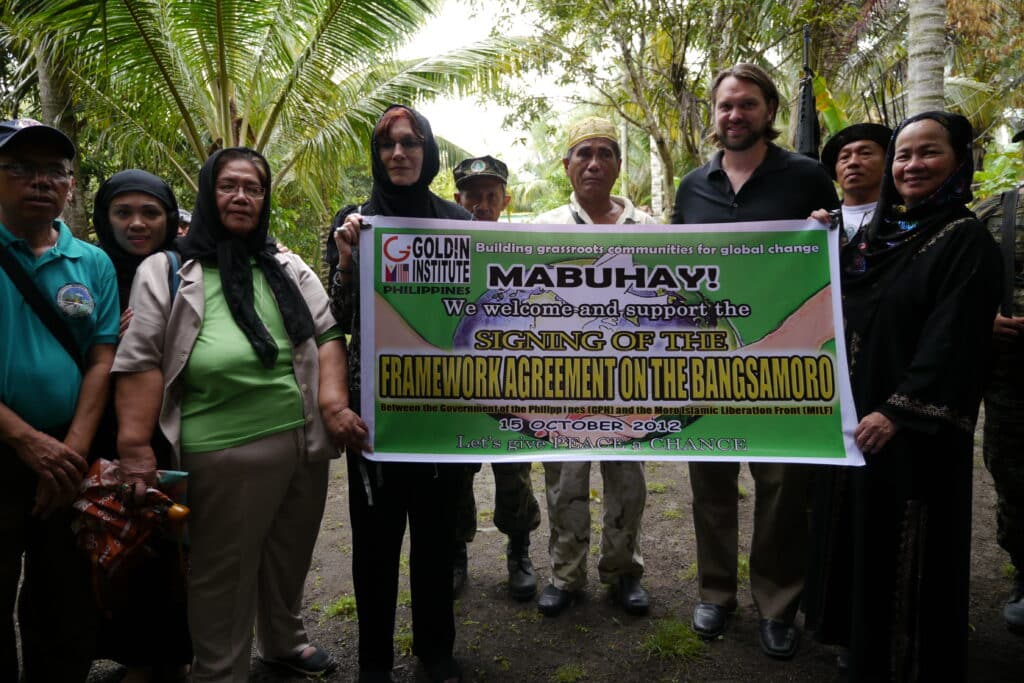
Journey with Goldin: Installing Water Pumps and Community Development
At the beginning of our conversation, she acknowledged that she gained education and skills in engaging with the Goldin Institute since partnering with grassroots communities. “I had a change of mindset. I now believe that peace and development are shared responsibilities between governments, private sectors, and grassroots communities, as they are all stakeholders of peace and development.”, she says. “I learned that through partnerships, we will yield more resources and services for the unserved and underserved in the communities.” Her values for volunteerism were also strengthened, alongside a more vital willingness to share skills to change lives, especially the out-of-school youth and illiterate adults.
She speaks about one initiative that evolved as part of the Goldin Institute’s work and its impact on helping the community with water pumps. “I was able to participate in a Goldin Institute Event in Taiwan about the provision of clean water, after which our team partnered on a project to provide water facilities in conflict-affected areas in Mindanao", she says.
Since that project, Dr. Anayatin has taken the installation of water pumps into her own hands. In three years, her organization installed about 430 water pumps in different schools, serviceable to school children and the adjoining communities. “This time, as a Member of the Bangsamoro Transition Authority Parliament, I could sustain the water project by saving some funds from our office. Since last year, we have constructed five water sources with hygiene and sanitation facilities in remote villages.”
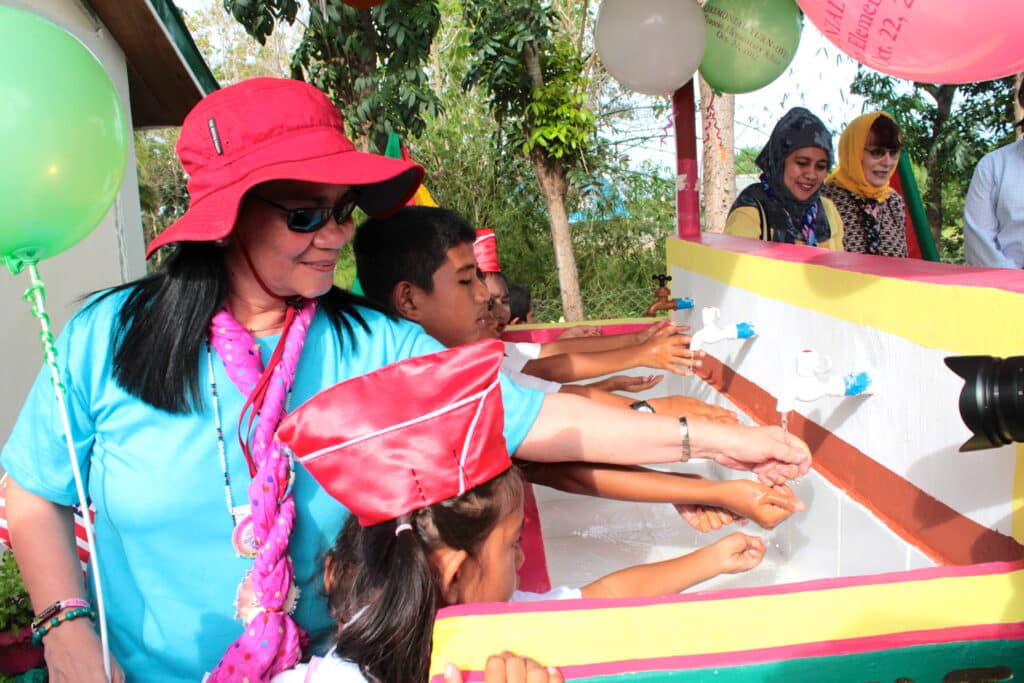
She is fortunate to have attended another Goldin Institute event about child soldier prevention in Colombia. “As a war orphan, I have been passionate about sharing some basic needs with war orphans here. We solicit food, school supplies, medicines, and clothes and bring them to orphanages. This time, since I have some sources, we take care of four orphanages, one home for older people, and a dormitory for disadvantaged students.” She further adds: “We are taking care of these war orphans because of their vulnerability to being recruited as child soldiers if they are left unschooled and homeless.”
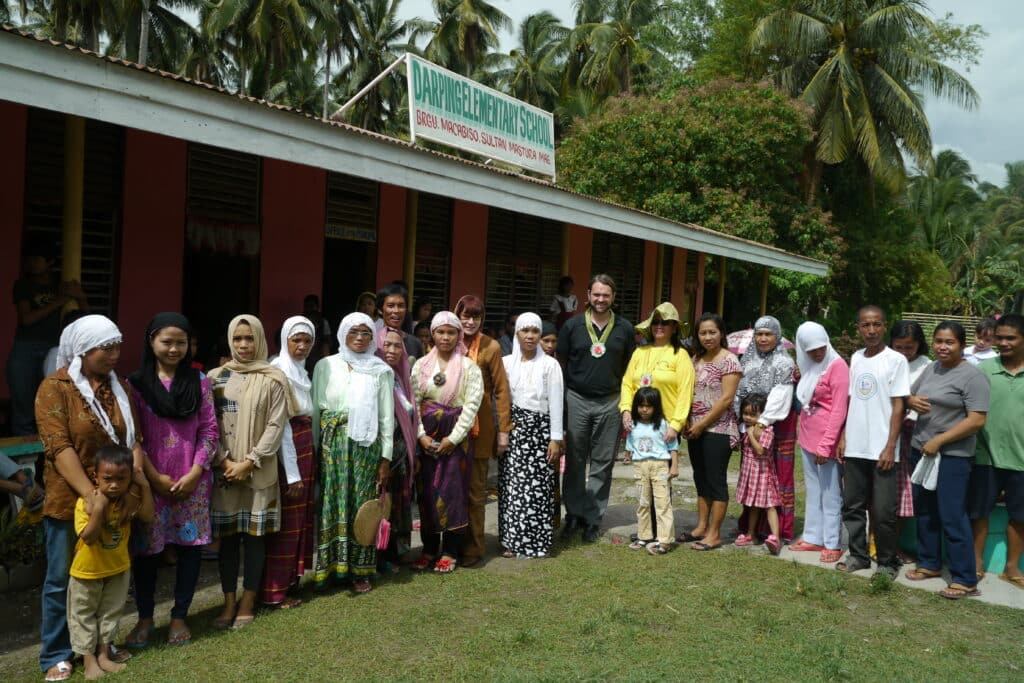
Turning a Personal Tragedy into Community Strength
Her motivation to get involved in peace and development work has its roots in a family tragedy- to which she did not surrender. “I am the daughter of activists who fought alongside the Americans against the Japanese Imperial Army during World War II. I became a war orphan because our father was killed in front of us in our house at the early stage of the armed conflict here in Mindanao.” Life has not been easy for her. “I had to work hard for my high school and college education at the backdrop of the armed conflict.”
Her brother, a policeman, was also killed brutally at the height of the kidnapping in Mindanao. “Despite poverty, I was able to finish college and landed a job in government. The loss of a father and a brother inspired me to join groups that advocate for peace, justice, human rights, and peaceful resolution of conflicts.”
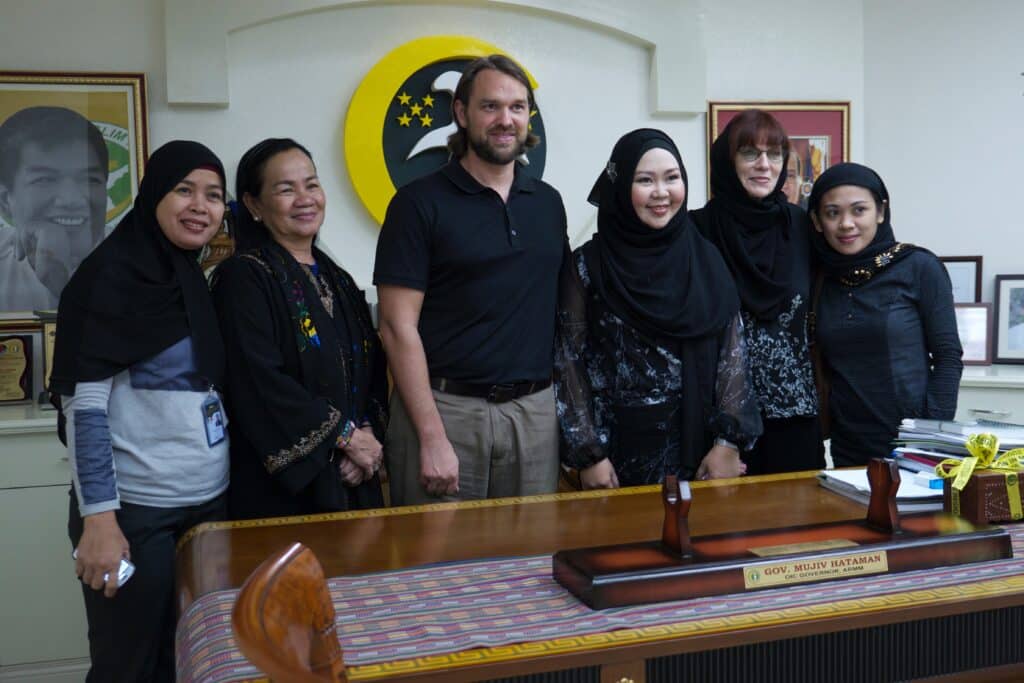
Sharing Decades of Learning: Peacebuilding as a Shared Vision and Dream
Dr. Anayatin shares with us also a key lesson she learned during her community-led peacebuilding work and efforts. There is a particular reaching that stands out to her as transformative. “I learned that peace is possible and that peacebuilding must not be dictated but a shared vision, dream, and passion where the stakeholders walk together along the journey.” She highlights that peace could be a lifetime process as a way of life.
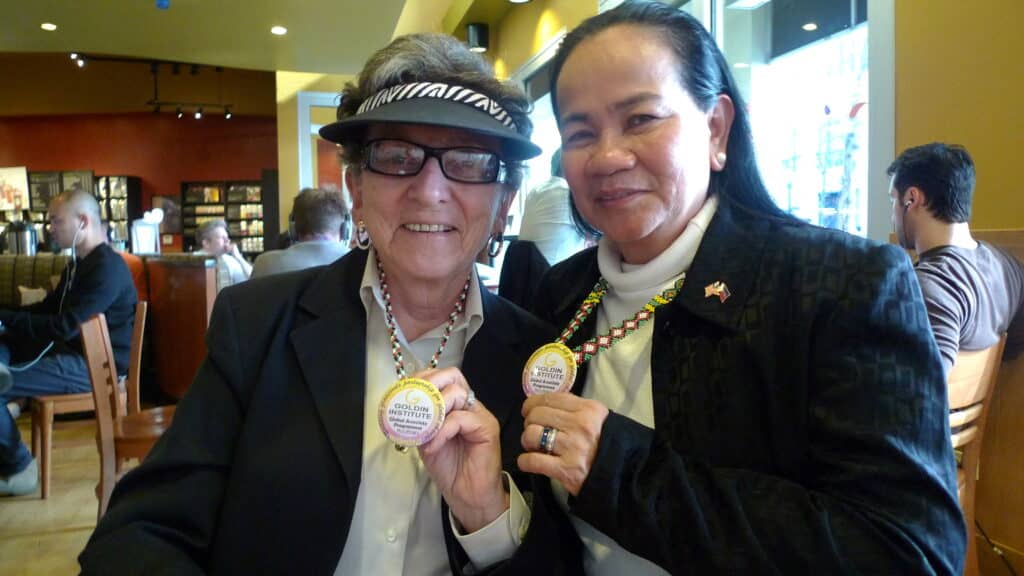
Speaking from her experience, she shares a mindset from which individuals and organizations working in peace can benefit. “Consultation must be conducted in project and activity planning. The environment of the communities is vital, from planning to implementation and monitoring of projects/activities to establishing ownership and sustainability.” she says. She draws attention to a crucial matter in the peace-building process and collective efforts to achieve that. “Peacebuilding is contextual. Culture, traditions, behavior, values, arts, et cetera matter and should be considered. Further, peacebuilding is a crucial factor for the success of peace initiatives.”
Spreading a Message of Hope and Unity
As the Goldin Institute recently celebrates its 21st anniversary, she notes the organization's most significant achievements. “The Goldin Institute created a platform for peace practitioners, academics, students, youth, and women to share knowledge, articles, and experiences in peacebuilding, conflict prevention, and post-conflict reconstruction. It established connections and reached people far beyond borders, especially in countries experiencing armed conflict and violent extremism. [...] People are interrelated regardless of creed, religion, ethnicity, political beliefs, and orientation. My experiences at the Goldin Institute allowed me to overcome the feeling of victimhood.” Concluding on a positive note, she recalls that now she enjoys a more peaceful life and is willing to journey and walk together with people from all walks of life.
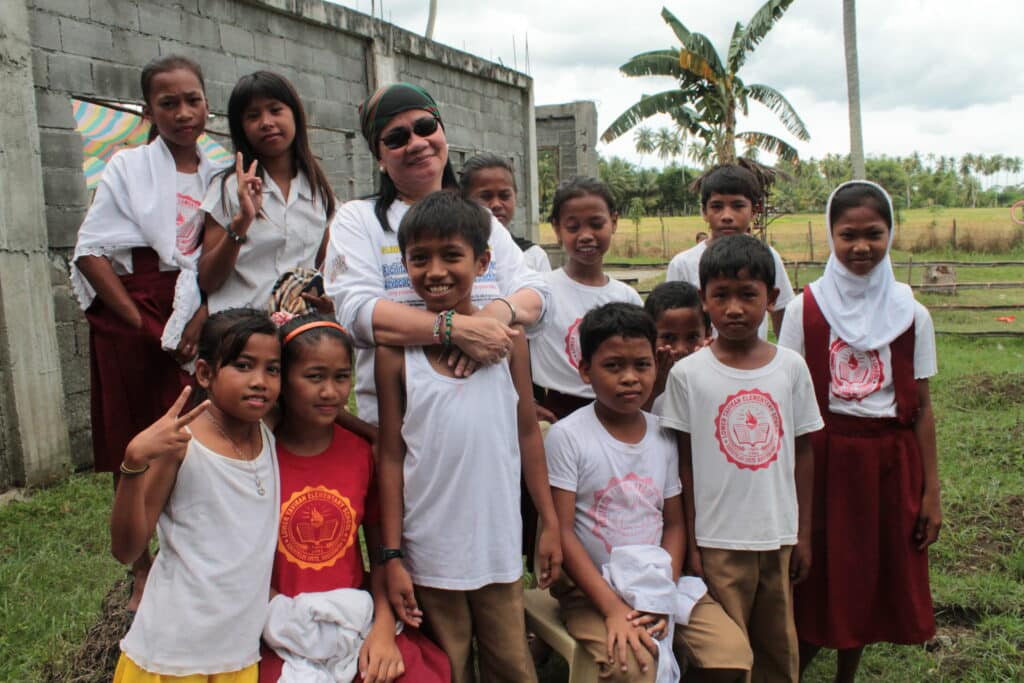
About Dr. Susana Salvador Anayatin:
Dr. Susana Salvador Anayatin pursued postgraduate studies in Peace and Development that enhanced her peace-building skills. She currently teaches Peace Education, both formal and informal, and one of the subjects is Conflict Resolution and Prevention of Violence Extremism. Most of her students and participants are youths, and she partners with local NGOs and the military since violent extremism is still an issue in Mindanao.
Celebrating 20 years of grassroots leadership and social change
By Jassi K. Sandhar, Global Research Fellow
It is very rare to find organizations like the Goldin Institute. As an employee of the Institute, I promise this is not a biased opinion. Having worked in the non-profit sector for 12 years, being involved in various social justice and human rights projects, the Goldin Institute has stood out as an organization which embodies principles of justice, fairness, equity, and kindness both within the Institute itself and in the work we do.
The importance of adopting grassroots approaches in social justice work is becoming increasingly recognized, but the approach taken by the Goldin Institute over the past two decades goes beyond that. It is grassroots-led and embedded in compassion, kindness and learning, from everyone but most especially those closest to the issues. We promote the voices of those often excluded who have the most at stake in making progress and ensure that they have leadership roles in every social change movement. Which is why it is extremely exciting to celebrate 20 years of the Goldin Institute.
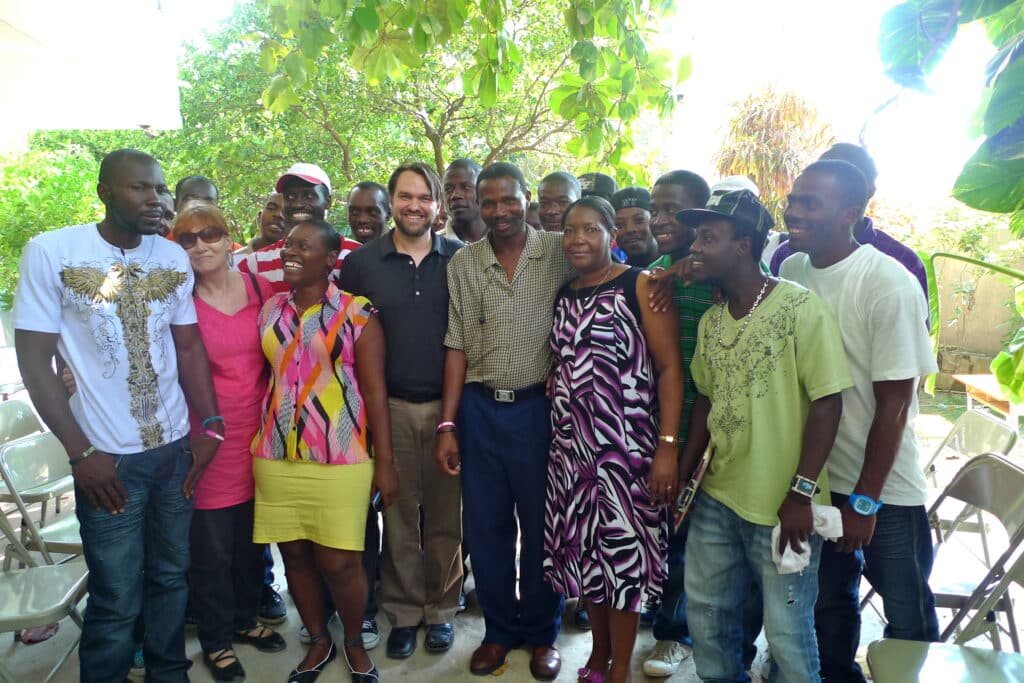
Our commitment to community-driven social change was foundational from our very inception. In October 2002, grassroots leaders from over 25 cities around the world convened in Chicago to learn from each other to collaboratively determine the mission, values and strategy of what became the Goldin Institute. The Goldin Institute was born through this conversation as an enduring platform to provide grassroots community organizers with tools and support they need to build meaningful partnerships within and between their cities. Fast forward to today, the Institute has expanded its reach to 150 Alumni leading change in 40 countries (and growing)!
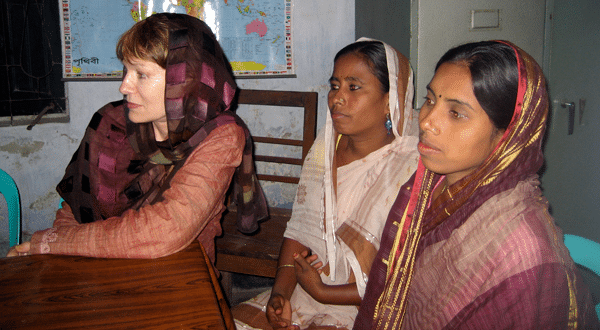
The last 20 years have taken us on an inspiring and incredible journey. We have worked with grassroots leaders in over 50 countries on issues such as:
- Child Soldier Reintegration in Uganda: In the discussions about disarmament, demobilization and reintegration of children used as soldiers in the conflict in Northern Uganda, the voices and perspectives of former child soldiers have too long been ignored. Former child soldiers themselves led a ground-breaking oral testimony process by interviewing over 150 of their peers and together reflecting on common concerns and shared aspirations that led to the creation of YOLRED, the first reintegration and support organization designed and run by former child soldiers.
- Addressing the Water Crisis in the Philippines: In war-torn Mindanao, over 70% of the population lacks reliable access to safe drinking water. Through the leadership of Global Associate Susana Anayatin and her team, over 40,000 people now have access to safe water in the region through the installation of water wells at over 140 local schools. In addition to providing a critical resource, this project brings together all sides of the conflict who are working together to “win the peace”.
- Tackling Gender-Based Violence in Haiti: Since the January 2010 earthquake in Haiti, women and girls living in the internally displaced persons camps face alarming rates of rape and other forms of gender-based violence. Through the leadership of Global Associate Malya Villard’s and KOFAVIV, men have joined the movement to provide security and advocacy to end all forms of gender-based violence in Haiti.
- Improving Microcredit in Bangladesh: The current global debate about the efficacy of microfinance is marked by the absence of those who have most at stake in the controversy: loan recipients. The Goldin Institute worked with partner organization Nijera Kori to lift up these voices, most often marginalized women, and restore their perspectives, insights and aspirations to the discussion, leading to the return of indigenous community support systems and greater regulation of the microfinance industry in Bangladesh.
- Mutual Aid Collaborative in Chicago, USA: Today, Chicago is stained by an enduring legacy of racial injustice that is laid bare by the disproportionate impact of the twin pandemics of violence and COVID-19 on our communities on the South and West sides of Chicago. In response, the Chicago Peace Fellows launched the Mutual Aid Collaborative as a model of the structural changes they seek, practicing a model of shared leadership, collaborative decision-making and collective action.
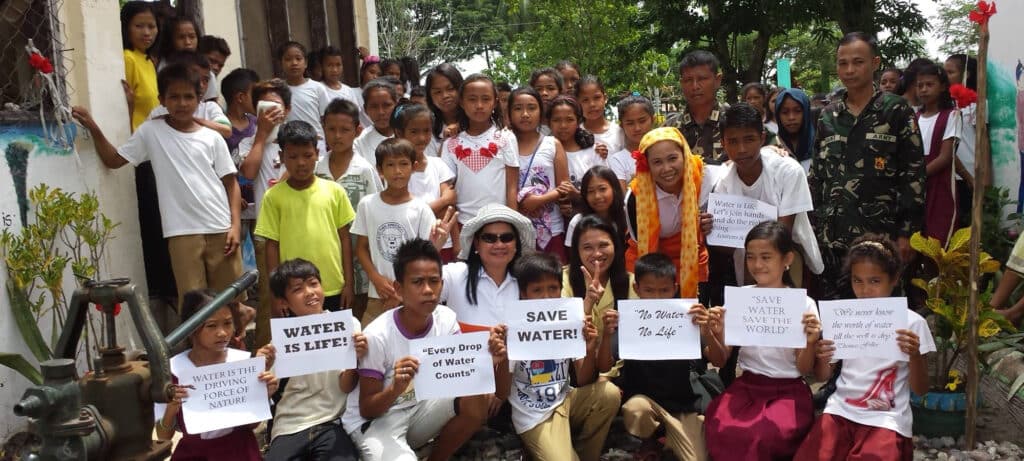
In 2018 we made significant strides in facilitating a global network of community leaders through launching GATHER, a tablet-based mobile learning tool to empower communities of practice. GATHER allows peers to learn, work and reflect together using practical tools. That same year, the Institute launched the Global Fellows program, an international cohort of 20 Fellows who collaborated with one another through a progression of learning about new theories of community engagement, practicing these ideas in their own areas, and reflecting together as a global community of practice.
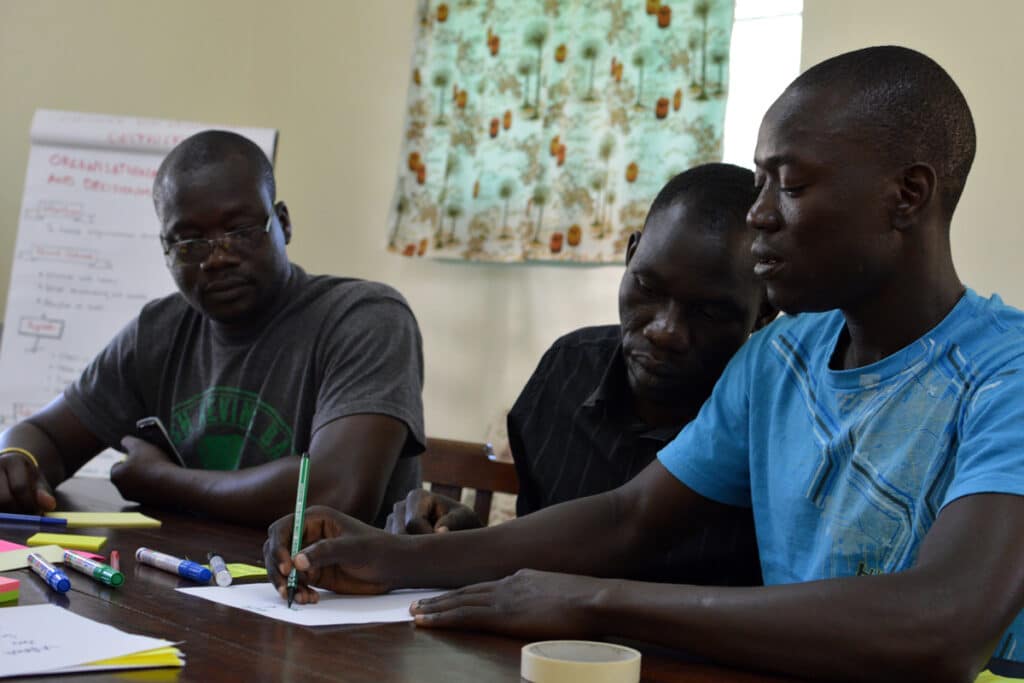
The success of the 2018 pilot has seen the GATHER course run annually with the Chicago Peace Fellows program and the Global Fellows program and, to date, we have trained 150 grassroots leaders in 40 countries in the GATHER curriculum. These grassroots leaders are local community or civil society leaders and practitioners, and represent a diverse group of backgrounds, ages, genders, and locations, and work on a range of pressing and urgent social justice issues. We are excited to continue this international Fellows program and excited to see what we can achieve together in the next 20 years.
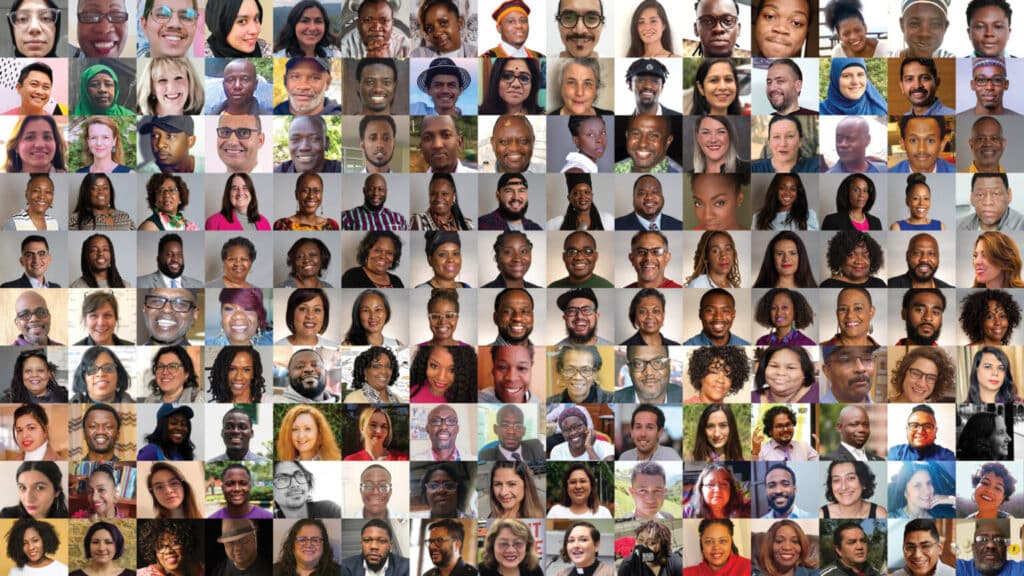
We thank you for sharing the last 20 years with us; we are particularly thankful for the continued commitment of our supporters who have stood beside us and ensured the vital work of our global network continues.
“Malya Villard Appolon, the founder of KOFAVIV (women's commission of victims for victims in Haiti), wishes the Goldin Institute a happy 20th anniversary for the good work it is doing around the world. It is because of the Goldin institute that KOFAVIV still exists today. It is still helping women who are suffering from tragic violence under armed gangs who are doing violence in all forms especially sexual violence that does not give chance to neither women nor girls. I will never regret that day Goldin Institute came our way. I am very proud of the Goldin Institute. I urge all organizations in the world to support Goldin to continue to bring change to the most vulnerable people within the Haitian society and other global communities. Thank you.” - (Malya Villard Appolon, Global Associate from Haiti).
Volunteering: the Key to Peace in Bangsamoro

There is a strong relationship between peace building and the role of volunteerism in the promotion of social cohesion, reconciliation, civic engagement, and the development of local human capacities. Volunteerism generates forms of social capital that are indispensable to peace-building, and it plays an important role in aiding the development of citizens capacities. While every post-conflict situation is unique, volunteerism is known to help regenerate certain fractured or absent dynamics that the processes of reconstruction and reconciliation typically aim to address.
Volunteerism is embedded in the Philippines, as voluntary activities have been carried out for centuries. Bayanihan is the traditional term for volunteerism in the Philippines.
Lo Ivan Castillon, Goldin Global Fellow

The term "bayanihan" relates to ancient traditions of values and is frequently associated with voluntary cooperation, such as when community members help one another move homes.
In the southern part of the Philippines, in the Bangsamoro region, volunteering has a significant role in sustaining the gains of the peace process. Volunteering is manifested in active citizenship in the Bangsamoro Youth Transition Priority Agenda (BYTPA) of the Bangsamoro Youth Commission (BYC). It includes active participation in the creation and appreciation of Filipino arts and culture as well as active volunteerism in youth-focused groups, networks, and other community organizations. Volunteering among diverse youth groups, especially in planning and decision-making for relevant programs conducted by youth-serving ministries and agencies, NGOs, and local government units (LGUs), can help to achieve regional and national peace. All youth are encouraged to share their unique culture, arts, and crafts in order to foster deeper connections and harmony among the different young populations in the region.

This sharing will also help preserve the various subculture’s diverse and amazing customs and arts. Volunteerism that exhibits social awareness and socio-civic consciousness, as well as the formation of values such as compassion for others and social responsibility, are all strategies to achieve active citizenship in community development and nation-building. To achieve this, Bangsamoro Youth Commission strengthens enabling mechanisms like policies and programs that support youth organizations and participation; engages youth in the preservation, protection, development, and promotion of Bangsamoro culture and arts; instils volunteerism through academic and community engagement; and fosters social awareness and responsibility in youth. Active citizenship in this aspect develops strategies to increase the number of youth volunteers in order to facilitate, diversify, and sustain youth volunteerism in the Bangsamoro region.

The Bangsamoro youth defined volunteerism as an interest, a willingness to serve, a passion, a commitment, a selfless act. The youth volunteers commit to being active citizens in promoting BYC's transition agenda based on moral governance, with a focus on utilizing knowledge, strengths, skills, and other resources to promote youth issues in relation to peace and development, and in rendering services without expecting anything in return.

Volunteerism is critical for the Bangsamoro youth because it serves as a reinforcement to the government's efforts and serves as a link between the regional and local governments and the community. Likewise, young people initiate research and data collection in order to express the public's demands and interests. On the other hand, Bangsamoro Autonomous Region in Muslim Mindanao (BARMM) institutions support youth volunteers by providing opportunities for knowledge sharing about health issues and establishing social enterprises for them. Scholarships for Bangsamoro youth and linkages to other organizations may be some of the services provided by the BARMM ministry. Furthermore, the stability of peace and order in some areas of the region must be prioritized to ensure safety, and young people must benefit from peace gains, especially in conflict-affected areas.
In places affected by violence, youth and youth organizations operate in schools or madaris, local communities, and other institutions such as churches and mosques. They focus on offering opportunities for volunteers and young people to engage in social responsibility and become agents of positive social transformation, peace, and sustainable development. Throughout the COVID-19 pandemic, various youth organizations developed projects to aid government and non-government organizations in the fight against the virus. This included hosting online conversations, promoting youth stories, projects, and home quarantine activities which provided psychosocial and peer support to youth during a period where there was a lot of uncertainty, worry, and daily changes.

Like other youth serving organizations in the Bangsamoro, Volunteers’ Initiatives in Bridging and Empowering Society (VIBES), an organization for which I am Founder, started from local youth volunteer outreach activities in Cotabato City and surrounding regions. Following the positive responses, we formed a space called the volunteers hub which allowed volunteers to participate in initiatives that "give back" to the communities. In VIBES, we believe that in everything we do, peacebuilding is our ultimate goal. We believe that all advocacy efforts, whether offline or online, in the areas of empowerment, the environment, and education, among others, contribute to the peaceful and sustainable development of our local communities. Whatever path we take, our goal is to provide avenues for youth advocacy and a chance to bring their visions to life.

In VIBES, we practice the Cycle of VIBES Volunteer Service as a framework of our operation, such as Identification of Volunteer Opportunities, Asset Mapping, Recruitment or Pool of Volunteers, Orientation and Capacity Building, Deployment & Immersion, and Documentation, Monitoring, and Evaluation.

In this endeavor, the whys of volunteering include valuable experience, increasing self-esteem, avenues for awareness and voice, social status, and spaces for social networking. In all of our initiatives, we involve various stakeholders as well as connectors. We make sure to understand the context of the community we serve, practice the Do No Harm principle, map the assets, and address their needs. Cultural sensitivity and a safe approach are significant. That is why speeches, words, and terms matter. We continue to explore and welcome innovative approaches, especially as we are dealing with young Bangsamoro.

Volunteers play a crucial role as enablers and multipliers in shaping the Bangsamoro youth as proactive agents of peace, development, and social transformation. The youth advocate moral governance as the guiding principle for all development programs. It stems from the willingness of the youth volunteer to serve in accordance with God's will. In full support of the whole-society approach, the idea of inclusion is implemented in order to promote a safe, non-discriminatory environment. It promotes respect for ethnic, gender, religious, and cultural diversity. The efforts and contributions of the youth volunteers introduce developments to the existing public and private sector systems and mechanisms. In the volunteers' continuous pursuit of social transformation, they serve as a key to sustaining the gains of the peace process in the Bangsamoro region and an extension of the development partners by maintaining the latter's ideals and aspirations in relation to the Bangsamoro's principles and vision.
Fellows Lead Relief Operations for Typhoon Odette Victims
By Andy Alegre, Global Fellow from the Philippines
With support from Goldin Institute board member Nathan Shapiro, I joined forces with Goldin Institute associate Susana Anayatin to deliver critical food and supplies to 482 families who were impacted by Typhoon Odette in the Philippines.

Leveraging our local contacts and connections with the Humanitarian Order of Sierra Falcones, Inc. (SF), Eastern Samar Chapter, we were able to distribute 482 relief packages filled with food, supplies, clothes and toys to targeted households affected by Typhoon Odette (International name, Rai) in Barangay Lunas, Maasin City, in Southern Leyte.
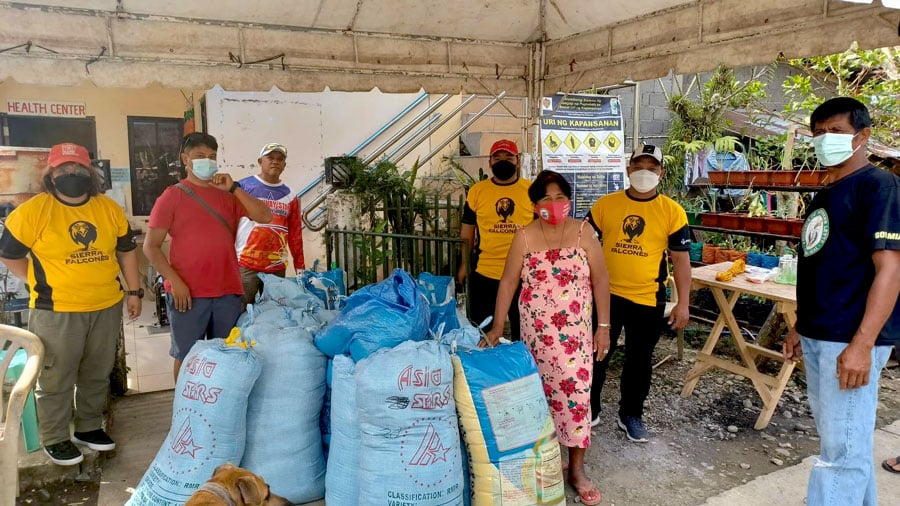
Barangay Lunas is a small community affected by Odette within the overall area of Maasin, which has a population of 87,446. The city is one of the hardest hit by the typhoon in the disaster-hit region in the Visayas with power yet to be restored and intermittent communication service.
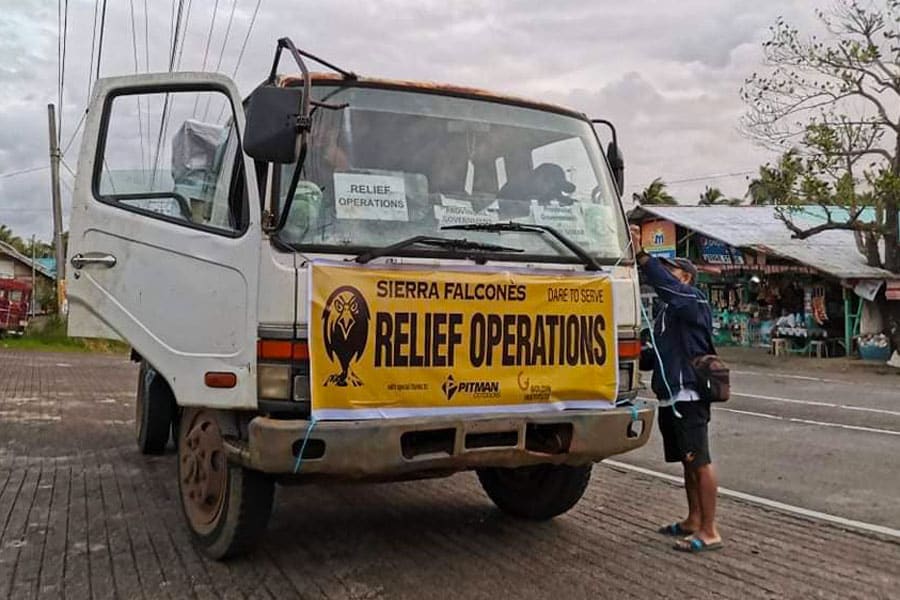
The SF members and volunteers were assisted by barangay officials in the distribution of relief supplies. The food and non-food items were prepared and repacked over a few days in Borongan City, Eastern Samar through the support and donation of various partners, organizations, individuals, and volunteers. These critical supplies were then loaded in a truck and sent to Maasin City. Coordination efforts were made by SF volunteer, Mr. Ariel Mendez of the Lunas Elementary School to the barangay council for the relief efforts.
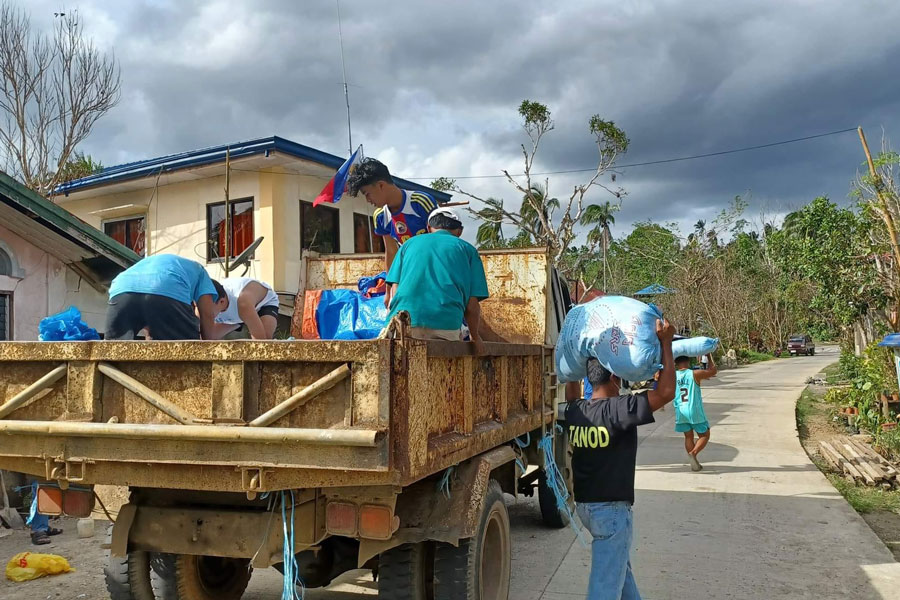
The area remains in need of support even though the Typhoon made landfall back on 16 December 2021. It brought torrential rains, violent winds, landslides, and storm surges. UN OCHA reported on December 30, that over 6.2 million people were affected across 10 regions. About 580,000 remain internally displaced with 356,000 people staying in evacuation centres while 227,000 people staying with host families or friends. The total death count is 397.
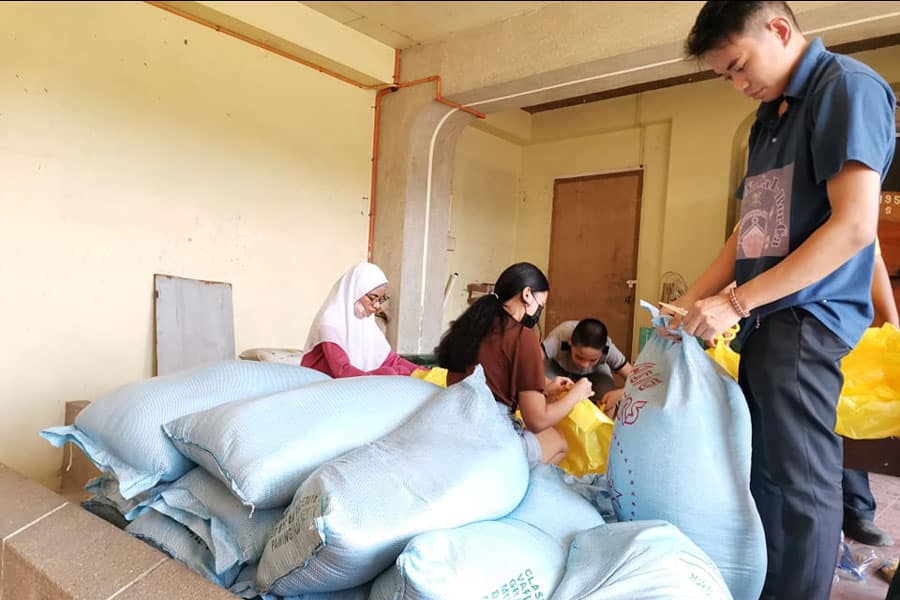
SF continues to plan and coordinate relief operations to different areas through its members and volunteers located in various chapters. Apart from the ongoing relief operations, SF strengthens its education programs through book drives, provision of education materials and radio-based instructions to remote communities at this time of pandemic.
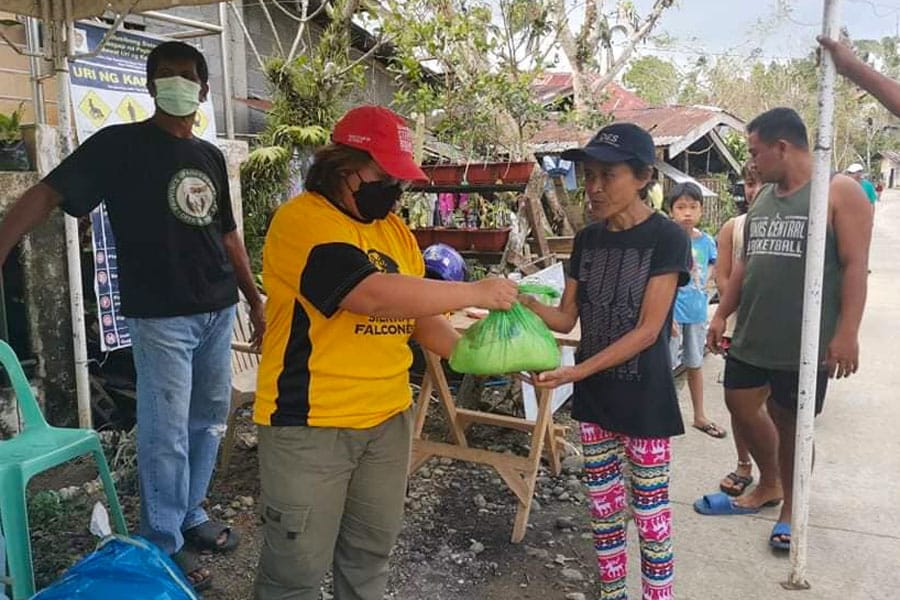
Again, thank you to the board and staff of the Goldin Institute, especially Nathan Shapiro, for standing with us in this time of crisis and rebuilding.
Progress in the Peace Negotiations in the Philippines

The Comprehensive Agreement on the Bangsamoro (CAB) signifies a great milestone of peace negotiations over decades of talks in the Bangsamoro region in southern part of the Philippines. It is significantly the compilation and sum total of all the agreements, declarations, joint statements, principles and mechanisms reached and agreed upon between the government and the Moro Islamic Liberation Front (MILF) from the start of the peace talks in 1997 up to March 2014.

The principles of the negotiation recognized the justness and legitimacy of the cause of over 3,256,140 Bangsamoro people, their aspiration for the meaningful autonomy through a democratic process, the aim of finding a solution to the Bangsamoro question with honor, justice and dignity and the aim to end the fighting between the government and the MILF. The Bangsamoro Autonomous Region seeks to replace the Autonomous Region in Muslim Mindanao (ARMM) with a political entity that shall possess broader powers to address the decades-long aspiration of the Moro people for meaningful self-rule over their ancestral homeland, and that is where the Bangsamoro government now.
The Bangsamoro Organic Law realized another step to continue the infrastructure of peace process as stated in the CAB. This is to put in place and frontline the clear roadmap that will provide direction to transitional justice and reconciliation measures for the Bangsamoro struggle. It serves as mark of the commitment for peace as it proposes conflict transformation mechanisms on the ground.

The existence of normalization bodies in the CAB ensures human security and helps build a society that is committed to basic human rights where individuals are free from fear of violence and long held traditions and values. Under of which is the Joint Normalization Committee (JNC) which undertakes the process of normalization, Joint Peace and Security Committee (JPSC) that develops policies and operational guidelines for the effective partnership of the JPSTs and Joint Peace and Security Teams (JPSTs) as working for the maintenance of peace and order and the stability of the areas mutually identified by the GPH ( refers to Government of the Philippines) and the MILF. On the other hand, Independent Decommissioning Body (IDB) is mandated to oversee the process of decommissioning of the MILF forces and weapons.
The socio-economic programs were intensified on development efforts for rehabilitation, capacity building initiatives, reconstruction and institutionalizing programs to internally displaced persons (IDPs), and poverty-stricken communities. The Joint Task Force for Decommissioned Combatants and Their Communities (TFDCC) was established also to assist the panel to identify and implement socio-economic priorities and development projects for decommissioned MILF combatants and their communities.
The ceasefire mechanism including the Coordinating Committee on the Cessation of Hostilities (CCCH), International Monitoring Team (IMT) and Ad-Hoc Joint Action Group (AHJAG) are collaboratively working in the commitment to a general ceasefire necessitated to the ongoing peace talks and in the ironing out security issues and concerns in accordance with the security protocols agreed between the GPH and MILF. These are the on-going work and established commitment of both parties that will be reinforced its implementation.
There would be struggles in the transition period.
Lo Ivan Castillon
But, the pressing support and collaborative participation of international community to the Bangsamoro government provides significant account on the covenant established and put in place the sincerity of the government leaders to pursue it. There would be proactive and reactive measures in accompanying the transition phase, education, continuing campaign against potential bottleneck and organized working group to explore alternatives.
This would be an opportune time for the Bangsamoro leaders to serve and govern the Bangsamoro community as to ascertain their confidence and capacities on moral governance in responding to basic needs, reducing poverty, bridging social gaps, eliminating anti-social activities, improving human security, improving peace and enhancing unity within the territory.
Opportunities offer to challenge various stakeholders and sectors in government, private and civic organizations to work hand in hand in developing different conceptual issues, methodologies, analytical language and institutional practice and strategic approaches on theory and practice of moral governance in the Bangsamoro government.
The future leaders and general public are called for their active involvement in the exploration of the existing and potential linkages in support to Bangsamoro homeland. Moreover, there is a need to strengthen advocacy on peacebuilding, culture of peace, conflict transformation, active non-violence and peace process as long-term goal through series of campaigns, public consultations, fora, research and information and education campaigns among others. This will provide venue in acquiring rich knowledge, experiences and insights of diverse educational communities to benefit mutually through collaboration and solidarity among all stakeholders.
The processes are not just aiming to have the absence of war but are aiming to have a society wherein social justice prevails, economic system creates equal opportunities to all, ecological balanced establishes, respect and honor for uniqueness of one’s culture, traditions and beliefs and development of full human potentials made available.
Indeed, the CAB is the achievement of the present government that concludes the 16th congress and showcased its relevance to peace process and to the Bangsamoro government. As Bangsamoro, there are more to do, more opportunities to grab, more collaborations to link with, and more advocacies to work on towards the Bangsamoro aspirations to have shared vision (with the national government for national unity and reconciliation and within the Bangsamoro for peace and economic stability), shared leadership, good governance, improved peace and security, adequate and proper management of resources and more inclusive dividend of peace.
The Promise and Peril of Working with Governments: A Global Gather/Chicago Peace Fellows' Roundtable
Last month, Jamal Alkirnawi and Lo Ivan Castillon led a discussion on March 16 for Global Gather and Chicago Peace Fellows entitled “The Promise and Peril of Working with Governments,” about the challenges and opportunities non-governmental organizations (NGOs) can face when seeking to partner with states, and local officials.
Both members of the inaugural Global Gather cohort from last summer, Jamal Alkirnawi leads New Dawn in the Desert, a Bedouin-Jewish organization in Negev Desert, while Lo Ivan Castillon is based in Cotabato City in the province of Maguindanao in the Philippines. Lo Ivan is a Peace Program Officer in the Office of the Presidential Adviser on the Peace Process.

At the outset of the conversation, space was created for attendees from around the world to share updates and personal feelings about the emerging, world-wide COVID-19 pandemic and its impact in their respective communities. Many were still adjusting to government-sanctioned “shelter-in-place” orders and the reality of physically distancing in crowded areas.
Jamal led the conversation with a detailed, highly informed PowerPoint presentation entitled “Head-On with the Governor.” In it, he identified three primary models of NGO engagement with governmental entities: 1) Nonprofits as supplements to government; 2) Nonprofits and government as complements; and, 3) Nonprofits and government as adversaries. While offering concrete, sometimes personal examples of the challenges and downsides of NGO-government relationships, Jamal was careful to highlight the upsides for both sides if certain frameworks principles are adhered. As he noted, NGOs may often be at odds with elected officials and government agencies over resources, influence, strategic approaches to shared challenges, but they don’t have to be. He pointed out what he sees as the “Four C’s” of NGO-Government Relations, including cooperation, complementarity, co-optation, and confrontation, with the first two being the preferred frameworks on which engagement should be built.
As a “Peace Program Officer” in the Office of the Presidential Adviser on the Peace Process, Lo Ivan is well equipped to speak from the perspective of governmental agencies’ experience with NGOs. He’s also worked closely with Global Gather Fellow Susana Anyatin on creating access to clean water in the most rural, isolated areas of the Philippines and understand the stresses on community-based efforts.
GATHER Alumnus Lo Ivan Castillon Shares Update from the Philippines

Greetings from Phillippines!
The Volunteers’ Initiatives in Bridging and Empowering Society (VIBES) is pleased to share with the Goldin Institute’s supporters about our activities in September 2019.
What were the highlights from your work this month?
VIBES through its Chairperson, Lo Ivan Castillon, participated in the Consultation Meeting as an organizational member of the Technical Working Group in the finalization of the Bangsamoro Transition Youth Priority Agenda (BTYPA) of the Bangsamoro Youth Commission (BYC) of the Bangsamoro Autonomous Region in Muslim Mindanao (BARMM) on 13-14 September 2019 in Kutawato Resto, Cotabato City. The objectives of the activity were to present and discuss the draft document and arrive at a final version which can be presented and discussed with the youth-serving ministries and development partners. BYC Executive Director Marjanie Macasalong, PhD, also a member of parliament, was in full support of the crafting of the BTYPA as a transition plan for 2019 to 2022. It was supported by UNICEF and UNFPA.

There were five priorities - health, education, peacebuilding and security, governance, and active citizenship. The peacebuilding and security priority ensures the promotion of human security, inclusive disengagement with reintegration programs, and the prevention of youths from association in armed groups, including participation in peacebuilding, conflict prevention and management initiatives, as well as safety efforts and development in the Bangsamoro region that contributes to national peace and security. It also integrated the youth, peace and security in all the strategies, objectives and programs considering the current and relevant issues confronting the youth in the region.
The draft BTYPA was presented to the ministries and offices of BARMM and to the development partners in the region on the 16th and 23rd of September 2019, respectively. Also, VIBES, as one of the members of the Technical Working Group of the Kutawato Messaging Hub, had a strategic planning on September 19-20, 2019 together with other CSOs and government agencies in Cotabato City and provinces of Maguindanao and North Cotabato. Hosted by Moroprenuer Inc. in the Bajunaid Building in Cotabato City, the activity was initiated and supported by the Equal Access International Philippines.

The Messaging Hub was also officially launched on the 20th of September with the goal of engaging grassroots communities on peacebuilding in the BARMM. It has the following outcomes:
- Increased community engagement in the normalization process and in the transition of BARMM
- Increased participation of youth and women in promoting peace
- Improved community socio-economic condition through social enterprise promotion
- Established positive and interactive community platform for information sharing and advocacy development
What activities were organized?
- In line with the celebration of National Peace Consciousness Month and International Day of Peace, VIBES conducted Basic Peace and Conflict Workshop for Children to 53 young leaders of Notre Dame Village Central Elementary School (NDVCES) on September 25, 2019 on the NDVCES grounds in Cotabato City. Several activities were facilitated where young leaders enjoyed and had fun during sharing and discussion sessions.
- September 5 October 5 is the celebration of Teachers’ Month. VIBES officially launched “Message for My Teacher” where the public were invited to share their messages to their teachers and take a selfie photo with them to be posted on their social media pages.
- VIBES is one with the world in striking for the climate. As part of our strike, we are challenging our fellow Vibers to take a video of themselves stating their commitment to save the environment and challenge 3 friends to do the same. This is an online platform campaign.

Thank you and more power!
Sincerely,
Lo Ivan Castillon
+VIBES Philippines
Volunteers Double the Impact of Grant from Lush Foundation

When our team in the Philippines received the grant from the Lush Cosmetics Foundation, they made a commitment to install 16 water pumps serving at least 3,500 students in Maguindanao. Thanks to the additional support from a crowdfunding campaign led by Board member Akif Irfan and the tireless efforts of a network of volunteers in the Philippines, our team more than doubled the impact we were expected to achieve.
This past year, the Philippines team exceeded all expectations by providing 36 water pumps at 35 different schools reaching a total of 5,884 students in five different municipalities across Maguindanao.
This is a remarkable acheivement anywhere, but especially difficult in the area of ongoing conflict where we work that this year flared into multiple indicidents of violence and a declaration of martial law. In our region, nearly three out of every four people lacks access to safe drinking water and children are especially hard hit and routinely become ill from contaminated water. This project brings water to schools in part so that children can stay healthy and in school and not travel great distances to retrieve water for their class, regularly losing precious classroom instruction time.

In addition to the direct service of installing water pumps at schools, our has been involved in a wide rage of meetings, events and forums throughout the year, especially around Peacebuilding and the "Bangsamoro Basic Law" legislation designed to reduce tensions in the region. In addition, the team expanded the partnership with the World Food Program to promote hygiene and sanitation for students, teachers and in food preparation.
There are many stories of children and schools whose lives were impacted by the access to safe drinking water that support from Lush made possible, but we are particularly proud to share an update about the five water facilities in Barangay Bugawas, Datu Odin Sinsuat in Maguindanao. Barangay Bugawas is a vulnerable and conflict-affected community where most of the residents have historically supported the aims of the Moro Islamic Liberation Front that is in an open and often violent conflict with the government. These communities have been engaged in the volunteer efforts to bring the water pumps to schools in this region and have coordinated their actions and worked shoulder-to-shoulder with leaders from both sides of the conflict, demonstrating that it is possible to work together to solve problems in ways that build momentum for peace in the region.
Get Involved: Campaign for Safe Water in Mindanao

For Advisory Board Member Akif Irfan, helping a grassroots organization solve a water crisis in the war-torn Philippine island of Mindanao is both part of his personal responsibility as a Muslim American, and just another chapter in his long relationship with the Goldin Institute.
This summer, Akif launched a fundraising drive with his family and friends to support the work of Global Associate Dr. Susana Anayatin and her team, who have provided water pumps to more than 113 schools in the Maguindanao province of Mindanao, serving over 40,000 students in a region where more than 70 percent of the population face obstacles to accessing safe water. Maguindanao is ethnically and religiously diverse, with a Christian majority and a sizeable Muslim minority as well as a significant number of animist tribes, along with a long history of inequity and outright oppression that has sometimes erupted into violence.

A local insurgency in Marawi City in the neighboring province of Lanao del Sur exploded when foreign fighters affiliated with the so-called Islamic State joined the fight and prompted a massive response from the Philippine Armed Forces this summer, including the imposition of martial law. When the conflict spread to nearby Maguindanao, the military stepped up its activities there as well. The conflict has literally come close to home for Susana on several occasions, as in September, when improvised explosive devices were detonated on a road she uses occasionally, wounding four people. Nevertheless, she has deftly navigated the political, economic and social hazards, collaborating constructively with all sides to provide tangible benefits to communities wracked by warfare and poverty.
To install the water pumps, Susana works closely with military officials who have the heavy machines they need and with the rebel groups who control the territory where some of the schools are located. The Goldin Institute has been working with Susana since 2011, providing her with financial resources and opportunities to meet with grassroots leaders from around the world. This training enhanced her leadership skills and reputation, and ultimately prepared her to serve as her community’s representative in an ongoing peace process. Late last year, Susana was appointed a commissioner of the 21-member Bangsamoro Transition Commission, which includes members of the Moro Islamic Liberation Front as well as the government and is dedicated to obviating further outbreaks of violence and ultimately establishing stability throughout the region.

This summer, the Goldin Institute was awarded a $20,000 grant from the Lush Cosmetics Charitable Foundation for the installation of 16 additional water pumps serving approximately 3,680 more students. The Lush Foundation, a philanthropic leader in supporting grassroots driven social change, also offered to provide information about the project on their website and on select product packaging to help raise awareness about the Goldin Institute’s work.
 As a Goldin Institute Advisory Board member, Akif has kept track of Susana’s efforts and saw an opportunity to build on this momentum. He initiated a fundraising drive that coincided with Ramadan, the Muslim holy month which ran from the end of May to the end of June. Unexpectedly, it was also the moment the conflict in Maguindanao intensified, adding new urgency to the campaign, since the installation of the water pumps solves an immediate need even as it supports cooperation between parties with historically fraught relationships.
As a Goldin Institute Advisory Board member, Akif has kept track of Susana’s efforts and saw an opportunity to build on this momentum. He initiated a fundraising drive that coincided with Ramadan, the Muslim holy month which ran from the end of May to the end of June. Unexpectedly, it was also the moment the conflict in Maguindanao intensified, adding new urgency to the campaign, since the installation of the water pumps solves an immediate need even as it supports cooperation between parties with historically fraught relationships.
[quote]“By installing pumps in schools, we are promoting education and helping to foster an informal peace process.-- Akif Irfan[/quote]
Akif continued, “In light of the recent increase in civil strife in Mindanao, the need to address water security has become even more critical.” Tapping his network of family and friends, he has already raised $5,085, to date, with an ultimate goal of $12,500, which will pay for water pumps at 10 new schools, serving thousands more children. The Goldin Institute has committed that 100 percent of the funds raised through Akif’s campaign will be used for the provision of safe drinking water.
Akif’s history with the Goldin Institute dates back to 2007, when he served as an intern while an undergraduate at Northwestern University studying economics. Now a vice president at the Goldman Sachs financial firm, he joined the Advisory Board in 2014, has represented the Goldin Institute at conferences in Mexico City and New York City, and contributed to the development of the Gather platform. While the history and status of Filipino Muslims is not well-known even within among Muslims, Akif, whose own family originated in South Asia, points out that the community on Mindanao suffers from discrimination as well as entrenched poverty and the catastrophic effects of climate change, and are therefore more likely to lack access to safe water.
[quote]“By bringing all sides together to solve problems, the Institute’s approach is helping to create lasting change." -- Akif Irfan [/quote]
[hl bg="#d1e1ff" fg="#FFFFFF"]Join Akif in supporting access to safe drinking water in the Philippines![/hl]
Philippines Water Project Reaches 40,000 students!
Working within a coalition of members in civil society, non-governmental organizations, the military, armed guerillas and parents, Susana and her team overcame persistent challenges which still remain moving forward.
A joint report released this month from the World Health Organization (WHO) and Unicef shows sobering numbers for safe drinking water access in the Philippines. According to the numbers released, 7.5 million Filipinos are without access to sanitary toilets, while 8.4 million do not have a supply of clean drinking water.
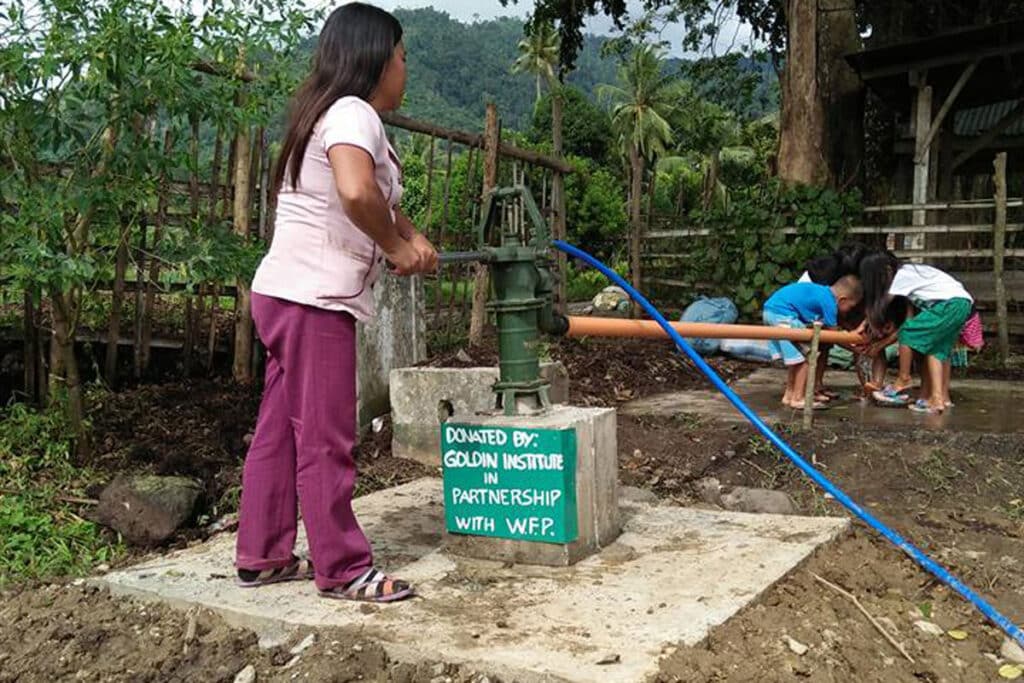
A local insurgency in Marawi City in the neighboring province of Lanao del Sur exploded when foreign fighters affiliated with the so-called Islamic State joined the fight and prompted a massive response from the Philippine Armed Forces this summer, including the imposition of martial law. When the conflict spread to nearby Maguindanao, the military stepped up its activities there as well. The conflict has literally come close to home for Susana on several occasions, as in September, when improvised explosive devices were detonated on a road she uses occasionally, wounding four people. Nevertheless, she has deftly navigated the political, economic and social hazards, collaborating constructively with all sides to provide tangible benefits to communities wracked by warfare and poverty.
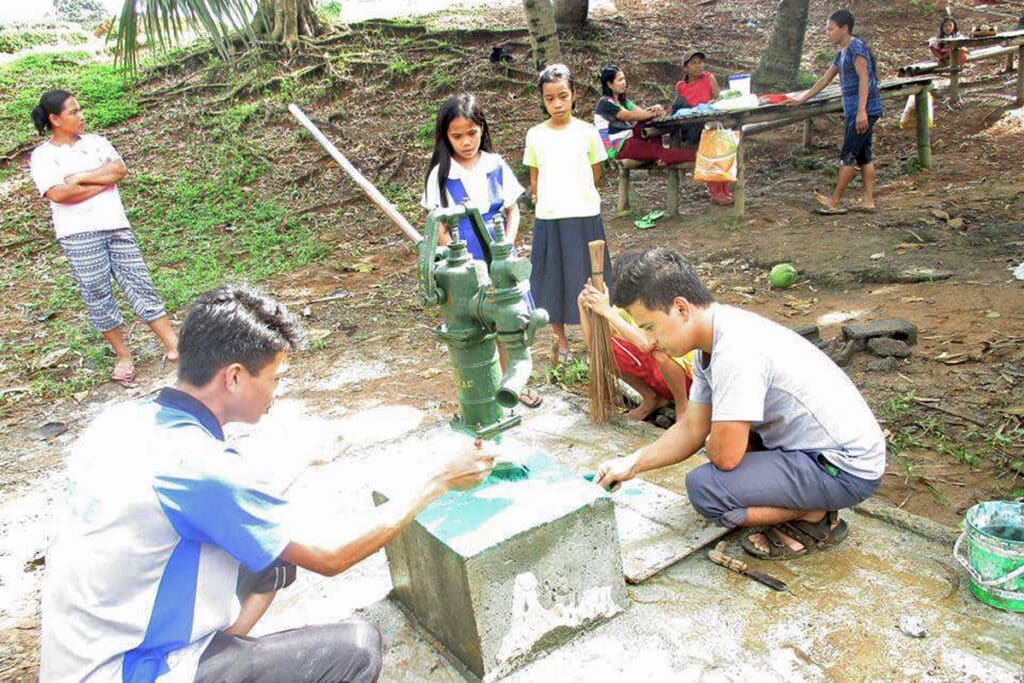
To install the water pumps, Susana works closely with military officials who have the heavy machines they need and with the rebel groups who control the territory where some of the schools are located. The Goldin Institute has been working with Susana since 2011, providing her with financial resources and opportunities to meet with grassroots leaders from around the world. This training enhanced her leadership skills and reputation, and ultimately prepared her to serve as her community’s representative in an ongoing peace process. Late last year, Susana was appointed a commissioner of the 21-member Bangsamoro Transition Commission, which includes members of the Moro Islamic Liberation Front as well as the government and is dedicated to obviating further outbreaks of violence and ultimately establishing stability throughout the region.
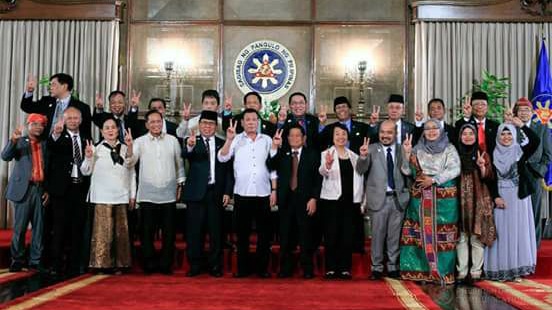
"It is summertime here in our region," Susana explained, "and our students are on vacation through the end of May. We are also dealing with flooding and as well as peace and security challenges. There are military operations happening in the areas we’ve targeted for water pump installation, as the national government is waging war under martial law."
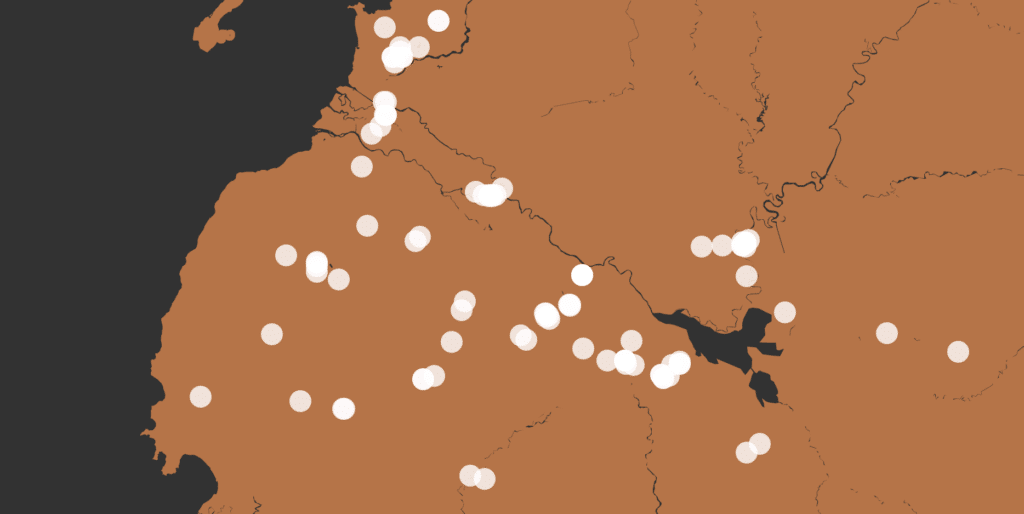
Even amidst these difficulties, progress continues as our partners have recently installed four more units, including one in a community where Muslims and Christians living and working together.
In addition to leading these water pump installation efforts, Susana has been chosen by these communities to be a representative in the national peace process since her appointment late last year as a commissioner of the Bangsamoro Transition Commission.'
